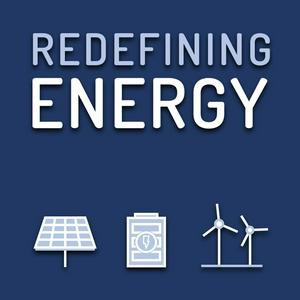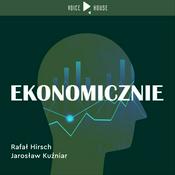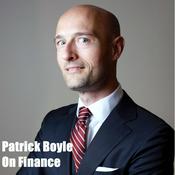174 odcinków
- Luca Pedretti, Co-Founder, Pexapark, returns to discuss how volatility, market design, and new contract structures are transforming power markets and renewable economics. What begins with PPA pricing quickly evolves into a broader conversation about where value is now created in the clean energy system.
We start with the growing importance of IFRS 13 fair value accounting. In increasingly volatile markets, long-term forecasts are no longer sufficient. Market-implied PPA prices are moving faster than fundamentals and are becoming a key signal for future capture rates and risk, forcing investors to reassess how renewable assets are valued.
The discussion then turns to Flexibility Purchase Agreements (FPAs), including tolls and floors for batteries. FPAs reflect a fundamental shift from generation toward flexibility and optimisation, as renewable-heavy systems face cannibalisation, negative prices, and widening price spreads.
With clean sources now accounting for nearly half of EU power generation, these side effects are becoming structural. Solar capture rates have dropped sharply in markets such as Germany, negative prices now occur in thousands of hours across Europe, and curtailment and balancing costs are rising. Batteries have become the system’s primary response.
We also explore how the buyer landscape is shifting. Hyperscalers and data centres are increasingly driving private PPAs, utilities are regaining relevance through trading and optimisation, and stand-alone renewable PPAs are showing signs of saturation. Despite this, capital deployment across clean energy continues to grow, signalling a reallocation of value rather than a slowdown.
The conversation concludes with a look ahead. Many renewable assets financed under merchant assumptions are now misaligned with today’s pricing reality. Battery tolls and floors are scaling quickly, consolidation among IPPs is accelerating, and capture rates remain unstable. The open question remains whether any buyers are willing to pay a green premium for co-located and hybrid projects in a market where flexibility has become central to value creation.
Link to Pexapark reports
IPPs:
https://go.pexapark.com/next-gen-ipp-playbook
Renewables Market Outlook 2026 - The Big Repricing: How volatility and BESS reshape clean energy markets (PPAs and FPAs):
https://pexapark.com/pexapark-renewables-market-outlook-2026/ - Resilience is the buzzword of the moment—from Gerard’s personal resilience on display in Davos last week to the critical issue of grid resilience.
The great Doug Houseman draws a useful distinction between reliability and resilience. “Reliability is about how well you keep the lights on, while resilience is about how quickly you can restore power after an outage.”
Over the past year, blackouts caused by extreme weather, human error, and physical attacks have exposed an uncomfortable truth: electricity is no longer invisible background infrastructure. It is the backbone of modern society, and when it fails, everything else quickly follows.
To explore these challenges, Laurent and Gerard sit down with Ronny Fiuren, one of the Nordics’ sharpest thinkers on energy. Ronny is the Founder of Mylicia Energy, an executive board member, and a strategic business developer with deep expertise in power markets, energy flexibility, and grid-oriented solutions.
Together, they discuss why resilience has evolved from a technical afterthought into a strategic priority, and what recent events across Europe and North America are really telling us about the condition of our power grids.
The conversation examines how decentralisation, flexibility, and the use of advanced technologies and AI matter more than ever. It also highlights the need for a shift in mindset, not only among grid operators but also regulators.
They explore the value of interconnectors in strengthening power systems, while also unpacking their political dimensions and the strong public emotions that can emerge when electricity prices rise suddenly.
Beyond weather-related disruptions and cyber threats, the discussion turns to new risks such as deliberate sabotage and how energy systems can be designed to cope with them.
From Scandinavia to the rest of Europe, this is a timely conversation about how to build power systems capable of withstanding shocks in an increasingly electrified and digital world.
----
Read Ember Europe Electricity Review
https://ember-energy.org/latest-insights/european-electricity-review-2026/ - The infrastructure fund industry has become one of the most powerful engines behind the rise of renewables and datacenters. With Zak Bentley, Americas Editor, Infrastructure Investor (part of the PEI Group), Laurent and Gerard cut through the noise to deliver a clear-eyed view of where the infrastructure market really stands today.
2025 smashed fundraising records, with c.USD300bn raised, but it also laid bare an uncomfortable truth: this is a market in consolidation mode. Capital is concentrating fast, and the biggest platforms are pulling further ahead.
Global Infrastructure Partners set a new benchmark with its USD25.2bn Fund V, the largest infrastructure fund ever raised. Macquarie closed more than USD8bn for Infrastructure Partners VI, including co-investments, while Blackstone raised USD5.5bn for Strategic Partners Infrastructure IV, the largest infrastructure secondaries fund to date. Brookfield, KKR, Copenhagen Infrastructure Partners, and Ardian were also among the clear winners. Scale matters, and the leaders are taking an ever-larger share of the pie.
Fundraising may look healthier on the surface, but the process has become longer and harder. Time on the road has stretched to around 25 months, meaning a large portion of the capital “raised” in 2025 was secured across 2023 and 2024. This is not a detail; it is the clearest symptom of the barbell dynamic now dominating infrastructure fundraising, where capital flows either to the very largest platforms or to highly differentiated specialists.
Sector trends are also evolving. Airports and toll roads, written off after COVID, are back in favour. Social infrastructure is fading. ESG has been reset, not abandoned, and gas infrastructure is once again being embraced, often relabelled as energy transition to make it palatable. Datacenters sit at the centre of everything, hoovering up capital and pulling renewables and grid infrastructure along with them.
The discussion goes straight at the hard questions: are genuinely new sectors emerging, can today’s giants realistically keep getting bigger, and is there still room for ultra-specialised strategies?
The answer is increasingly clear. Bigger is not automatically better. Investors are becoming far more selective, and many are shifting capital toward focused, mid-market funds that offer expertise rather than sheer scale.
-----
Berlin Infrastructure Conference – 24 to 27/3
https://www.peievents.com/en/checkout/?peievcc-event-id=113021
Link to Nat Bullard – 200 pages yearly deck
https://www.nathanielbullard.com/presentations - Heat pumps sit at the heart of Europe’s strategy to cut emissions and reduce dependence on imported gas. Under the EU’s REPowerEU plan, the bloc is targeting 60 million heat pumps by 2030. By the end of 2025, almost 30 million units were already installed — progress, but still only halfway to the goal.
Gerard and Laurent are joined by Paul Kenny, Director General of the European Heat Pump Association (EHPA), to unpack why adoption has surged in countries such as Japan, Scandinavia and parts of the US, while many European markets continue to lag.
After a strong year in 2022, European heat pump sales slowed in 2023 and 2024 amid high upfront costs, a shortage of qualified installers, weaker policy support and an unfavourable price relationship between gas and electricity. Paul explains why confidence is returning in 2025, with 1m heat pumps sold across 13 European countries in the first half of 2025, a 9% increase on 2024.
We also look beyond residential heating to the rapid rise of industrial heat pumps, which could become a major decarbonisation tool for sectors requiring heat below 200°C, including food processing and pharmaceuticals. The conversation explores how heat pumps can add flexibility to the power system, in some cases reducing the need for battery storage, and why data centre heat management is emerging as a key new application.
As the leading voice of Europe’s heat pump industry, EHPA is working to make heat pumps the preferred technology for sustainable heating and cooling — strengthening Europe’s competitiveness, resilience and energy security in the process.
-----
At Redefining Energy, we are excited to be part of International Energy Week, where some of the biggest names in global energy come together for a packed agenda tackling the ideas, technologies, and policies shaping the future. ENGIE's CEO Catherine MacGregor will be speaking, as well as IEA Executive Director Dr Fatih Birol and Shell's CEO Wael Sawan.
Join us there and get 20% off your ticket with the promo code REIEWEEK20. https://www.ieweek.co.uk/
--
Finally, Gerard and Laurent are invited by Jan Rosenow, professor of energy and climate policy at Oxford university and an energy policy expert, for a live session at Oriel College in Oxford on 25/2/26. 211. The last Mile revolution: turning Distribution Networks into Flexibility Powerhouses - Jan26
12.01.2026 | 30 min.Laurent and Gerard sit down with Jo-Jo Hubbard, CEO of Electron, to explore why the centre of gravity in the energy transition is shifting decisively toward the distribution grid. Jo-Jo explains why the “last mile” is becoming the true engine of system flexibility, how demand at the edge must become a core resource, and why DSOs aren’t confused about flexibility at all — they simply respond to the incentives regulators design. Flexibility, she argues, isn’t replacing grid reinforcement but making it smarter, helping utilities target and sequence investments far more efficiently at a time when distribution upgrade costs are rising quickly.
We discuss how to escape the sector’s obsession with endless pilots, and why real scale only arrives when year-round, rules-based products give suppliers and aggregators the confidence to automate and invest. The conversation then turns to the economics of location — from REMA to zonal pricing — and why congestion at the distribution level is where flexibility competes most effectively with copper. Jo-Jo also lays out what it takes to get millions of households engaged without overwhelming them, making the experience effortless, automated and consistent across retailers.
She breaks down the hardest parts of the DER orchestration stack, noting that the real challenge isn’t cloud infrastructure but standardising how device capabilities and network constraints are described across a patchwork of utilities. Looking ahead to 2030, Jo-Jo argues that no single asset class “wins”: value depends on time, place and service, with EVs likely providing tens of gigawatts of potential flexibility but orchestration remaining the true hero.
We cover the future of interoperability and open data — not via global standards, but through adapters and translation layers similar to those that shaped the internet — and examine the cybersecurity demands of cloud-based orchestration as it becomes critical infrastructure. Jo-Jo also gives a global view of progress, from Australia’s rapid adoption to the US’s accelerating regulatory push and Europe’s mix of strong TSO-level progress but uneven local action. She closes with reflections on whether the centralised grid is dying, who should ultimately control DERs, whether blockchain still has a role, and what a nightmare scenario looks like in a DER-dominated world.
A fast, clear, and deeply insightful conversation on the rise of flexibility, the reinvention of the distribution grid, and the technologies and rules needed to orchestrate millions of devices.
Więcej Biznes podcastów
Trendy w podcaście Biznes
O Redefining Energy
Two investment bankers weekly explore how tech, finance, markets and regulations are radically redefining the world of energy: Renewable Energy, Electric Cars, Hydrogen, Battery Storage, Digitisation...Your co-hosts: from Berlin, Gerard Reid and from London, Laurent Segalen.Our LinkedIn page: https://www.linkedin.com/company/redefining-energy/X handle: @Redef_Energy
Strona internetowa podcastuSłuchaj Redefining Energy, Inwestomat - oszczędzanie, inwestowanie, wolność finansowa i wielu innych podcastów z całego świata dzięki aplikacji radio.pl

Uzyskaj bezpłatną aplikację radio.pl
- Stacje i podcasty do zakładek
- Strumieniuj przez Wi-Fi lub Bluetooth
- Obsługuje Carplay & Android Auto
- Jeszcze więcej funkcjonalności
Uzyskaj bezpłatną aplikację radio.pl
- Stacje i podcasty do zakładek
- Strumieniuj przez Wi-Fi lub Bluetooth
- Obsługuje Carplay & Android Auto
- Jeszcze więcej funkcjonalności


Redefining Energy
Zeskanuj kod,
pobierz aplikację,
zacznij słuchać.
pobierz aplikację,
zacznij słuchać.







































